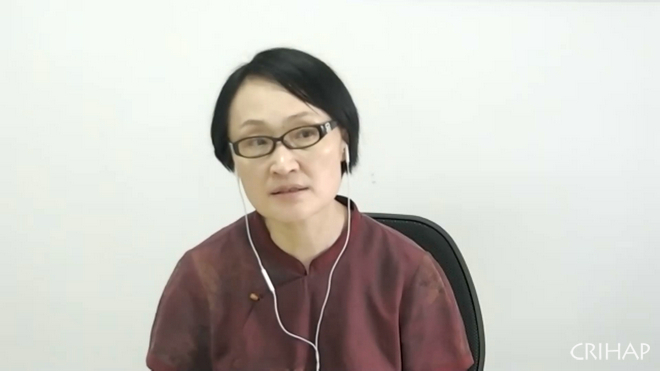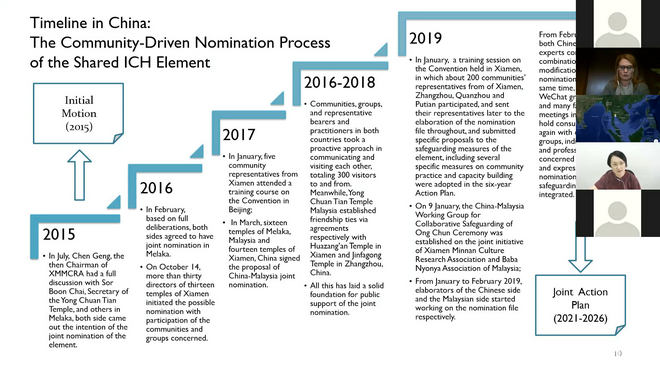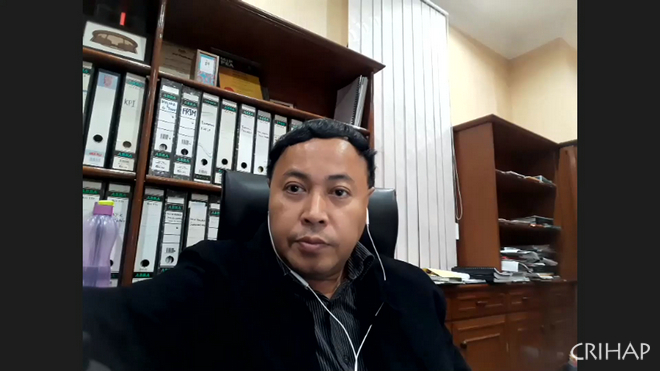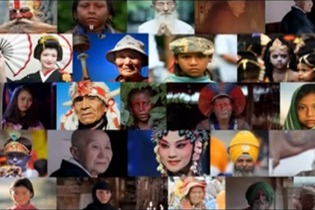Capacity-building Workshop for Southeast Asian Countries held online
 |
| Bamo Qubumo, a researcher with the Institute of Ethnic Literature at the Chinese Academy of Social Sciences, talks at the workshop. |
Besides providing a briefing about the latest developments in ICH safeguarding in the face of COVID-19, Bamo Qubumo emphasized the roles governments, NGOs and communities played during the nomination process, as well as smooth collaboration among local communities.
Mohd. Syahrin Bin Abdullah elaborated the process of nomination; its challenges, difficulties and solutions.
 |
| Bamo Qubumo, a researcher with the Institute of Ethnic Literature of the Chinese Academy of Social Sciences, talks about the Ong Chun/Wangchuan/Wangkang ceremony, rituals and related practices for maintaining a sustainable connection between man and the ocean, jointly nominated by China and Malaysia. |
During the workshop, trainees also participated in group discussions on topics such as fish and shrimp paste-making, the practice of Alms-giving in Buddhist communities and the celebration of Vesak Day.
With these ICH elements popular in Southeast Asia as examples, the ICH facilitators guided trainees to work on multinational nomination simulations so as to put their new knowledge into practice.
During the closing ceremony of the workshop, Duong Bich Hanh, chief and program specialist for culture at the UNESCO Office in Bangkok, said the workshop enabled trainees to better understand the process of multinational nomination on ICH, and the fruitful group discussions fully tackled shared heritages in Southeast Asia.
She said multinational nomination is a complex process which needs close cooperation between policy-makers, researchers, related institutions and local communities, as well as concerted efforts from all parties involved.
 |
| Mohd. Syahrin Bin Abdullah, director of the World Heritage Division at the Department of National Heritage of Malaysian Ministry of Tourism and Culture, talks at the workshop. |
UNESCO attaches great importance to ICH safeguarding in Southeast Asia and has developed textbooks for the region with rich content ranging from local cultures to religions to enhance a shared historical and cultural identity among peoples in Southeast Asia. The workshop offers a rare experience for trainees from Southeast Asia countries to better understand each other, she concluded.
After four days of study and discussions, the trainees gained a deeper understanding about each other. They all expected to strengthen future cooperation and make greater contributions to ICH safeguarding work in Southeast Asia.
They all agreed the Workshop on Multinational Nomination on ICH served well as a platform of dialogue and communication for ICH safeguarding workers in Southeast Asia countries, and they believed a shared experience at the workshop will help bring them closer in carrying out multinational nominations on ICH and cultural exchange in the future.
Up to now, CRIHAP has organized a total of 54 Intangible Cultural Heritage Capacity-Building workshops, covering 40 countries and regions, with 1,856 direct beneficiaries.

Address: 81, Laiguangying West Road, Chaoyang District, Beijing, China
Zip Code: 100021
Tel: 86-10-64966526
Fax: 86-10-64969281
E-mail: crihap@crihap.cn
Leave us your e-mail address, we'll let you know about current events.



